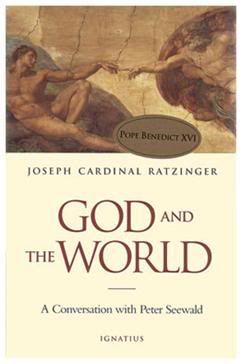 Very grateful to Ignatius Insight for excerpting this because it is very relevant today - with three historic papal initiatives in play: the dialog with the Lefebvrians, the dialog on the primacy of the Pope with the Orthodox, and the offer to Anglicans wishing to convert to Catholicism. And that is why I am posting it here first rather than on the RATZINGER-TEXTS thread.
Very grateful to Ignatius Insight for excerpting this because it is very relevant today - with three historic papal initiatives in play: the dialog with the Lefebvrians, the dialog on the primacy of the Pope with the Orthodox, and the offer to Anglicans wishing to convert to Catholicism. And that is why I am posting it here first rather than on the RATZINGER-TEXTS thread.
No other modern Pope before him probably had to ponder so much about the nature of the Papacy as did Joseph Ratzinger, at a time when he certainly had no idea he would ever become Pope. For him, it was a historical and theological exercise that he first confronted in depth when preparing to take part in Vatican II.
His insight about the Pope's singular role as guarantor of obedience in the Church is particularly applicable in the face of the many and continuing challenges to his authority and Magisterium by bishops of the Church who should know better but don't - or delude themselves that Vatican II 'made them 'equal' to the Pope'.

Excerpted from

SEEWALD:
Many people have the idea that the Church is an enormous apparatus of power.
CARDINAL RATZINGER: Yes, but you must first of all see that these structures are supposed to be those of service.
The Pope is thus not the chief ruler – he calls himself, since Gregory the Great, "Servant of the servants of God" – but [G}he ought to be, this is the way I usually put it, the guarantor of obedience, so that the Church cannot simply do as she likes.
The Pope himself cannot even say, I am the Church, or I am tradition, but he is, on the contrary, under constraint; he incarnates this constraint laid upon the Church.
Whenever temptations arise in the Church to do things differently now, more comfortably, he has to ask, Can we do that at all?
The Pope is thus not the instrument through which one could, so to speak, call a different Church into existence, but is a protective barrier against arbitrary action.
To mention one example: We know from the New Testament that sacramental, consummated marriage is irreversible, indivisible. Now, there are movements who say the Pope could of course change that. No, that is what he cannot change.
And in January 2000, in an important address to Roman judges, he (John Paul II) declared that in response to this movement in favor of changing the indissolubility of marriage, he can only say that the Pope cannot do anything he wants, but he must on the contrary continually rekindle our sense of obedience; it is in this way, so to speak, that he has to continue the gesture of washing people’s feet
The papacy is one of the most fascinating institutions in history. Besides all the instances of greatness, the history of the popes certainly does include some dramatic and abysmal low points. Benedict IX, for example, reigned, even after being deposed, as the 145th pope, as well as the 147th and the 150th. He first mounted the throne of Peter when he was just twelve years old. Nonetheless, the Catholic Church holds fast, with no exceptions, to this office of the vicar of Christ upon earth.
Simply from a historical point of view, the papacy is indeed a quite marvelous phenomenon. It is the only monarchy, as people often put it, that has held out for over two thousand years, and this in itself is quite incomprehensible.
I would say that one of the mysteries that point to something greater is quite certainly the survival of the Jewish people.
[To all those Jewish carpers out there: Note how spontaneously Joseph Ratzinger pays homage to the Jewish people!]
On the other hand, the endurance of the papacy is also something astonishing and thought provoking. You have already suggested, with one example, how much failure has been involved and how much damage the office has had to suffer, so that by all the rules of historical probability it should have collapsed on more than one occasion.
I think it was Voltaire who said, now is the time when this 'Dalai Lama of Europe' will finally disappear, and mankind will be freed from him. But, you see, it carried on.
So that’s something that makes you feel:
This is not the result of the competence of these people – many of them have done everything possible to run the thing into the ground – but there is another kind of power at work behind this. In fact, exactly the power that was promised to Peter. The powers of the underworld, of death, will not overcome the Church.